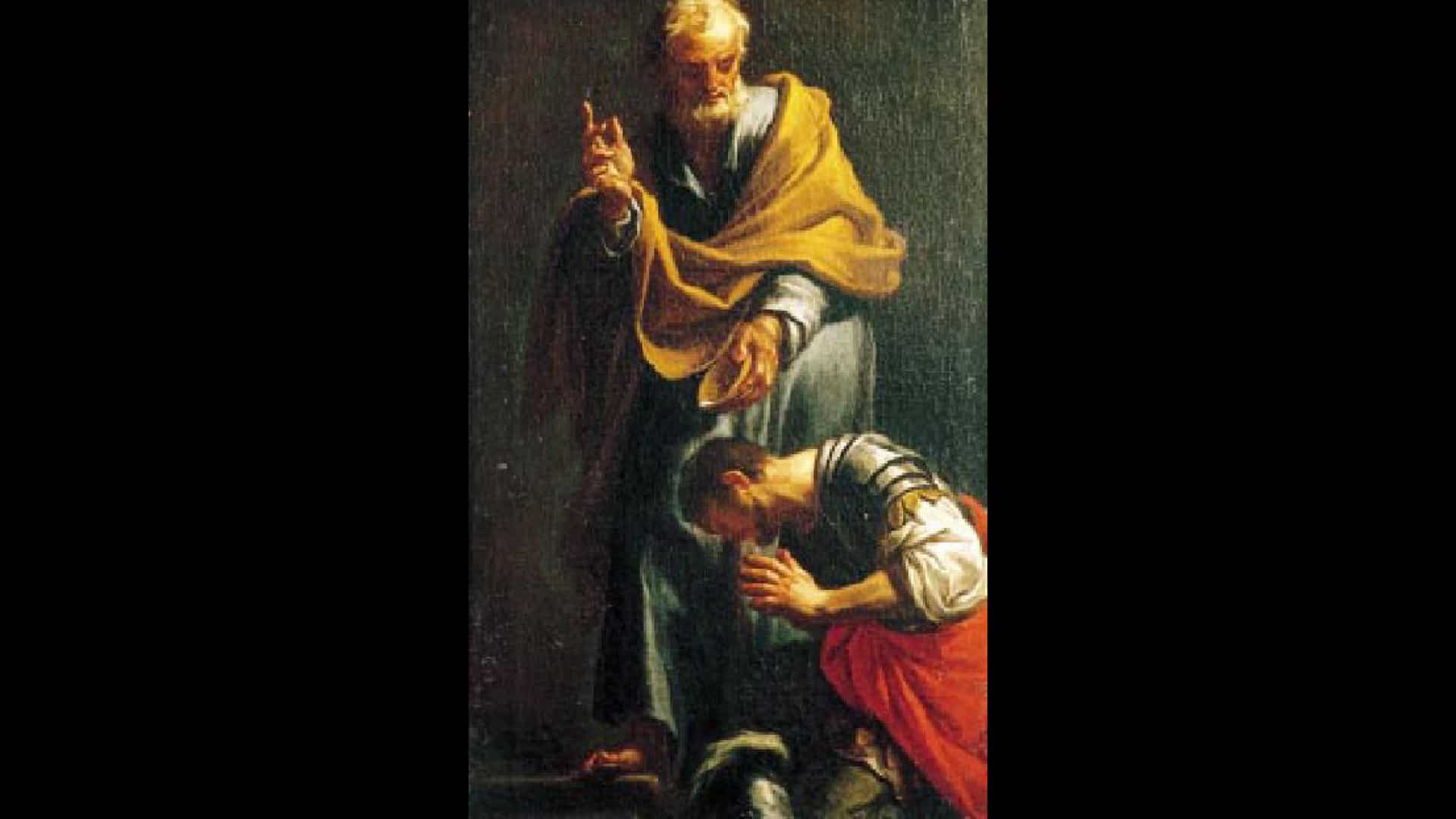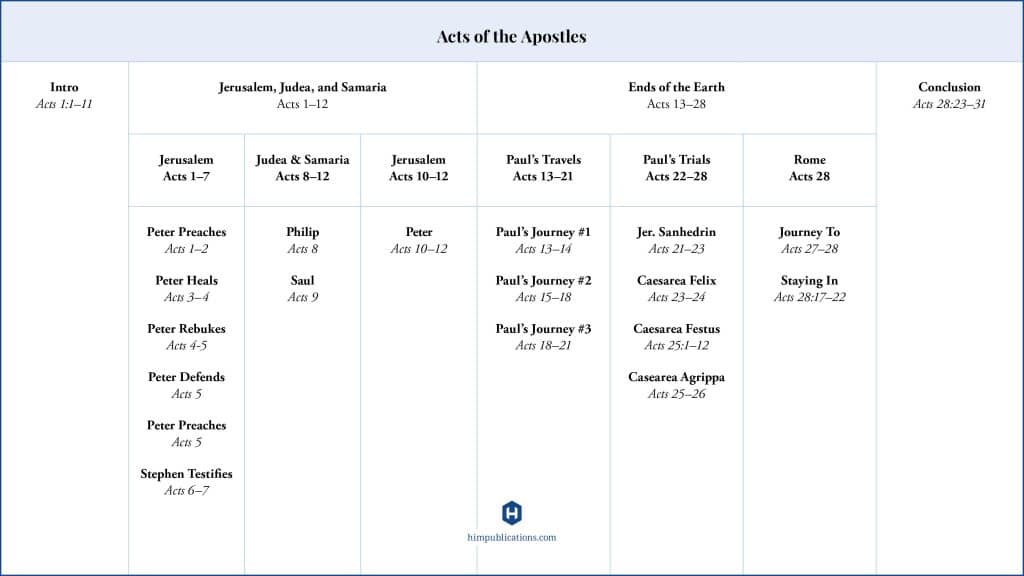Thousands of people converted to Christ in the New Testament book of Acts. Yet we don’t hear all their stories. We hear a limited number of those stories, including Cornelius’s story.
The Story of Cornelius in Acts 10
Cornelius appears in Acts 10 at the start of the Gentile mission. Luke told the full story in Acts 10:1–48, but here’s a summary of the story:
- Cornelius prayed.
- God heard Cornelius and sent Peter.
- Peter preached the good news
- Cornelius and his friends and family accepted the good news.
- Peter realized afresh that God shows no favoritism.
Locating the story of Cornelius in Acts 10 in the larger picture of Acts is helpful. Here’s my outline of the book to help with that task.
Click here to download and use this outline for teaching and preaching.
Who Was Cornelius?
Cornelius was:
- A leading soldier, a “centurion,” which means a leader of 100 (Acts 10:1)
- Well-respected by all the Jewish people (Acts 10:22)
- A leader for his friends and family (10:24)
What Did Cornelius Do?
We see Cornelius take action throughout this narrative.
- He obeyed (sent three men to Joppa, Acts 10:8).
- He believed (he expected Peter by believing God, Acts 10:24).
- He opened his home (invited his relatives and close friends, Acts 10:24).
- He listened to the gospel (he and his household listened to everything Peter said, Acts 10:33).
- He responded to the gospel (by being baptized and receiving the Holy Spirit, Acts 10:48).
While Cornelius took action in these ways before he heard the gospel and after, the main actor in this story was God. We see God’s action throughout this narrative.
- God gave Peter a dream.
- God gave Cornelius a vision.
- God sent Peter to Cornelius.
- God acted through Jesus the Christ to bring the good news to the world.
- God moved to win the hearts of Cornelius and his household to Christ.
You can see this reality at play in the story:
Cornelius took action, but God was the main actor.

While Peter showed initiative and obeyed God’s instructions, God commanded him to speak; God gave the Holy Spirit; and God wove this incredible narrative together, dramatic irony and all.
Why did God include this story in Acts? And what significance does it play in the overall message of Acts?
This story reveals three significant messages, which the rest of this post will explain in turn:
- God responds to us.
- God strategically expands his kingdom.
- God cares about the nations.
Let me explain how I see these messages in Acts 10 and beyond and why they matter for us today.
1. God Responds to Us
What reasons did God have for choosing Cornelius to be among the first non-Jews to hear the gospel? Why God choose to send Peter to him?
It’s similar to why God works through anyone. We don’t know all the reasons, but it’s helpful to look at each person’s story uniquely. Why did he pick Abram? Why Jacob? Why Paul? Each narrative gives us a window into God’s heart.
When we get to the book of Acts, we see God choosing certain people to hear the good news about Jesus before others. God had scores of people from whom to choose, so why Cornelius in Acts 10?
I believe God chose Cornelius, in part, because of Cornelius’s piety.
Let me be clear: Cornelius didn’t earn God’s graces. Rather, he positioned himself to receive them. This principle connects to a biblical truth we all know of God:
“He rewards those who earnestly seek him.”
This quote comes from Hebrews 11:6, but we find the principle elsewhere (for example, Luke 11:1–13).
One of those golden threads throughout Scripture is that God rewards those who earnestly seek him. His reward? The gift of himself, ultimately.
Jeremiah the prophet brought this message home:
“Then you will call upon me and come and pray to me, and I will listen to you. You will seek me and find me when you seek me with all your heart. I will be found by you,” declares the Lord, “and will bring you back from captivity. I will gather you from all the nations and places where I have banished you,” declares the Lord, “and will bring you back to the place from which I carried you into exile.” (Jeremiah 29:12–14)
I appreciate this passage because it reveals God’s heart to redeem fallen people, especially those who want him. That’s why God includes the detail about seekers who find him: “when you seek me with all your heart.”
Note how the prayers of God’s people went up to God as tokens of their seeking him. God responded to their seeking, which is what we see in the life of Cornelius.
God responded to Cornelius’s prayers and piety.
Another reason God chose Cornelius was because of Cornelius’s generous gifts to the poor. The words of the angel reveal this:
Your prayers and gifts to the poor have come up as a memorial offering before God. Now send men to Joppa to bring back a man named Simon who is called Peter. He is staying with Simon the tanner, whose house is by the sea. (Acts 10:4–6)
He was devout, righteous, and God-fearing (Acts 10:2, 22), but that wasn’t the full story. He took action, and God responded to him.
Cornelius didn’t earn God’s favor, but God responded to him.
This statement may create tension for you. If God’s grace is not earned, then how could God rightly respond to Cornelius’s actions?
Dallas Willard resolves this tension well when he writes:
“Grace is opposed to earning, not to effort.”1
So while God’s grace poured out on the house of Cornelius in response to his effort in almsgiving and prayer, Cornelius didn’t earn the grace. It was a gift of God.
Jesus’ teachings reveal a similar principle, although to a different audience. In the Sermon on the Mount, Jesus said the Father rewards us for our prayers and gifts to the poor (the very actions of Cornelius at issue in Acts 10).
Jesus made this clear when he repeated with regard to both of these acts of piety, “Your Father, who sees what is done in secret, will reward you” (Matthew 6:4, 6).
This isn’t works-based righteousness, as if we could earn heaven. Jesus was describing God’s rewarding response to his children. He wasn’t talking about earning salvation but about living out the salvation life. Jesus taught God rewards his children for their obedience and we build treasures in heaven through our actions of piety (Matthew 6:20).
So while we don’t earn his rewards through effort, our efforts cause God to respond with grace. It’s worth repeating Willard’s resolution to this tension: “Grace is opposed to earning, not to effort.”
While God responds to our efforts with rewards for real righteousness, we don’t earn our right standing with God. We’re saved by grace “through faith—and this not from [ourselves], it is the gift of God,” Paul reminds us. Salvation is “not by works, so that no one can boast” (Ephesians 2:8).
That’s a long way of saying God responded to Cornelius’s prayers and gifts to the poor. That’s part of why he chose him for this sliver of the story of Acts.
Why is this significant for us?
There’s a difference between meaning and significance. “Meaning” is what the text means; “significance” is why the text matters for us today. I’ve covered the meaning as I understand it, but what about its significance for us?
The story of Cornelius, to the point at issue here, reveals that God responds to us:
- He hears our prayers.
- He sees our actions.
- He rewards those who earnestly seek him.
Don’t believe the lie that your actions don’t matter to God. He wants you to seek him, and he meets you in your seeking. He rewards us, by his grace, in correspondence with our heartfelt actions of piety.
Why does he care about our actions?
Our actions reveal our hearts.
God wants our hearts, not just our outward obedience. But our repeated actions, ultimately, reveal the state of our hearts. Our repeated actions reveal the trajectory of our hearts—and that’s what God looks at.
While he doesn’t judge based on outward appearances or with favoritism, he does look at the heart (1 Samuel 16:7; Acts 10:34).
Outward appearances can deceive, but repeated outward actions often reveal our hearts.
So to those who earnestly seek the righteous life, take heart that God sees your generosity, hears your prayers, and according to the words of Jesus, will reward you for those acts of righteousness when they’re done with the right heart.
2. God Strategically Expands His Kingdom
The story of Cornelius reveals the strategy of God’s mission to the Gentiles. I find it very encouraging, for example, how God uses the city of Joppa in the story. “Joppa” carried with it echoes of the story of Jonah for Jewish readers.
To where did Jonah run from God’s commission to preach to the Gentiles? Joppa. He boarded a boat in Joppa to run away from God.
Jonah serves as a foil to Peter.
God chose Joppa, ironically, to signify to Jews: Hey, God has always had a heart for the nations! This is what redemption looks like. That is, the very place to which one of God’s missionaries ran on his way to Tarshish and away from his mission to Nineveh. This is the place God picked up the story to establish an outpost for the kingdom.
This dramatic irony tells the Jewish readers of Acts that God was doing a fresh work with regard to his mission to the Gentiles. That’s why, I believe, we read this story twice in Acts 10–11. (In Acts 11, Peter tells the story of what happened in Acts 10.) God used Cornelius and his house as a new outpost for kingdom expansion.
So Cornelius’s piety was a factor, but also Cornelius’s location played into God’s decision to choose him for this segment of his mission. That is my suspicion, at least.
In summary of this point, God chose Cornelius because it worked well to accomplish his mission.
God, the Master Strategist

We don’t understand the full reason God does anything—he’s mysterious, omniscient, and sovereign—but God’s actions give us insight into his heart. When I piece together the clues of this story, I can see God’s strategy revealed in Acts 10–12.
Often we think about the strategy of Satan, as Paul talks about it in Ephesians 6: “Put on the full armor of God so that you can take your stand against the devil’s schemes.”
The Evil One schemes and fights against believers, trying to derail the church’s purpose and God’s mission in the world. But God opposes this strategy and uses the church to do so. That is, the body of Christ fights against Satan to take ground for the kingdom.
And when the two teams are pitted against each other, God will out-strategize Satan every time. After all, why would the devil be a better strategist than God?
Satan’s strategic, but God’s the master strategist.
The story of Cornelius in Acts comes at a pivotal point in the early church’s expansion and missional strategy. Now the church may not have had a thought-out strategy, but God certainly did.
Soon after the Cornelius segment concludes, we witness the Gentile mission taking center stage. The primary theme of Acts 13–28 is God’s mission “to the ends of the earth” (Acts 1:8)—to the Gentiles.
So God chose Cornelius strategically as a God-fearer whom all the Jew respected in order to help other Jewish Christians accept other Gentile converts to Christ (Acts 10:22). Indeed, this sets the tone for the rest of Acts and the Gentile mission that Paul led.
What’s the significance of God’s strategy here?
While God works spontaneously through his Spirit, he’s also strategic in his moves of the Spirit. That is, the Holy Spirit doesn’t just do freestyle, he also writes a rhyme to be performed; his approach is not just spontaneous but also structured; his movement is not just fluid but also fixed.
People tend to see God as someone who either plans or improvises.
But Acts reveals God’s strategic methodology, even if the method appears to be more like madness to us. That’s why Luke emphasizes throughout Acts how the apostles went first to the Jews and the synagogues and then to the Greeks.
This connects to the life of Jesus, who first gathered the lost sheep of Israel before he sent the apostles to the Gentiles. This begs the question:
Does God Favor One Nation Over Another?
For over a year, I worked at Carrabba’s Italian Grill in Nashville, Tennessee. Hiding one’s identity as a follower of Jesus in the restaurant industry is hard. People would sometimes bring up my faith, even if I hadn’t overtly witnessed to them.
As I walked in one day to get ready for my shift, the bartender stood behind the counter preparing the bar.
She said, “Can I ask you a question? Why did God choose Israel and not the other nations for salvation?”
Whoa, I thought. That’s a profound question for a pre-shift conversation!
She explained how this was a barrier to her because God appeared to be nationalistic, xenophobic, or some other form of racist. To her, the God of the Bible was a god of favoritism.
This gave me the opportunity to explain God’s true heart and strategic mission. I told her how God didn’t exclude the other nations from salvation. He chose one nation to begin with, but his goal from the beginning with Abram was to reach every “family” with his blessing (Genesis 12:3, ESV).
So I explained to her this truth:
God’s missional methodology was strategic, not xenophobic.
That is, God never sought to cultivate a people who would hate the stranger, the refuge—the xenos (Greek for a political “alien”). God simply had a strategy that involved focus. The scandal of particularity applies to Israel, not just Jesus. His choosing of Israel was a strategic choice, not a favoritism decision.
We find this thread in the story of Cornelius too. God didn’t save Cornelius because of his merit; rather, his merit signaled to God a strategic outpost for the kingdom in uncharted territory: the land of the Gentiles.
As we form our missional strategies, we must anchor them in the heart of God. He moved centrifugally in Acts: from the inside out (at the heart level) and from Jerusalem out (at the geographical level). This isn’t a prescription to adhere to but a principle to give credence to.
As you think about your life, the life of your community, and even the life of your church, keep in mind God’s strategy in Acts. Let his heart and his actions through the early church inform your strategy.

3. God Cares About the Nations
The final point of significance I want to draw out from Acts 10 is God’s heart to extend his gospel to the world. First, we must ask, “What is the gospel?” We find the answer to this question, in part, in Acts 10 by answering another question:
What did Peter say to Cornelius?
Peter presented the gospel to Cornelius, which is a theme throughout the book of Acts as we hear the early church’s gospel presentation.
What is the gospel precisely?
I appreciate what authors N. T. Wright and Matthew W. Bates, among others, have written about the gospel. Their common thesis is the gospel can be summarized in a simple statement:
Jesus is the Christ.
This distilled gospel message must be expounded, explained, and contextualized for hearers, so don’t misunderstand me here. It includes Jesus’ divinity, his life, death, burial, resurrection, exaltation, and the Second Coming, among other aspects.
Yet the essence of the gospel, according to the Gospels and Acts, is the announcement that Jesus is the saving king. He’s the Anointed One of Israel, who came to save people from their sins. The gospel involves more than that, but it’s not less than that.
For more on the gospel, read Bates’s Gospel Allegiance or The Gospel Precisely.
We see this gospel message clearly in Peter’s preaching to Cornelius: “You know the message God sent to the people of Israel, telling the good news of peace through Jesus Christ, who is Lord of all” (Acts 10:36).
The essence of the good news, before Peter got into the details, is Jesus’ lordship as king over all.
Peter then expounded on:
- Jesus’ power over the devil (v. 38)
- Jesus’ death (v. 39)
- His resurrection (v. 40)
Not to mention the other aspects of the gospel he shared in Acts 10.
At the end of the day, though, Peter shared the gospel. This aligns with God’s heart to bringing the gospel to the nations.
The Significance of Cornelius in the Bible
The story of Cornelius in the Bible shows us how God responds to us, strategically expands his kingdom, and cares about bringing the gospel to the nations. Knowing these aspects of Cornelius’s story changes our approach to life today.
- God responds to our actions, which gives us motivation to act, not just sit passively. We must act.
- God employs his church strategically to accomplish his mission on earth. We must think strategically too.
- And God still cares about bringing the gospel to the nations.
In today’s multicultural world, we have more opportunities than ever before to reach the nations in and around us—not to mention through online platforms and global initiatives.
How can you join his mission today? Even if you’re not sent, how can you join those who are sent through prayer or financial support? As the story of Cornelius in Acts 10 reveals, God responds well to those types of actions from his saints.

Notes
[1] Dallas Willard, The Great Omission: Reclaiming Jesus’s Essential Teachings on Discipleship (New York: HarperOne, 2006), 34.
Subscribe to HIM Publications here to get long-form discipleship content delivered to your inbox each week.

